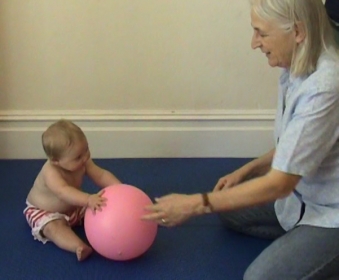Two important questions
What lies at the heart of every encounter between a therapist and an infant or child? And what is it that we as developmental therapists wish to achieve?
For me the answers to these two questions are quite clear and really quite simple.
Firstly at the heart of each and every moment I spend wth a child there should be a positive and enabling relationship based on trust, that values and honors the infant's or child's feelings, needs and goals just as they are in that moment.
And secondly my approach to intervention, and aim for each session with an infant, is to explore with the infant and the family ways in which abilities and skills can be learned and expanded to increase and enable function and participation.
In addition everything I do is informed by a very clear understanding that an alert infant, with happy level of arousal and willingness to engage with me and whatever tasks or activities we are busy with, is a pre-requisite for any learning and change to occur.
Why do I value these ideas?
I am a physical therapist and built into my professional DNA is the certain knowledge that the only way to improve function and participation is hard work and practice.
But apart from my professional bias, I also know that infants learn through experience and active engagement with developmentally appropriate tasks. They learn by doing; doing builds brain connections whether the doing is self-regulation, communication or reaching, rolling, sitting, crawling or walking and talking and everything else that infants do.
The desire for action and interaction drives an infant's development. My role as a developmental therapist is to support the infant's family to provide the best possible environment for learning. I do this by exploring with the infant what works, and modeling how best to encourage the infant to engage and put effort ino tasks. And for this I need to have a very good relationship with the infant.
So what do all these high ideals mean in practice?
Well firstly I will spend as much time as is needed to establish a trusting and happy relationship with each infant. I use the very informal term "happy" because it is the best word to describe the quality of the relationship I strive for - the infant and I should both take pleasure in each other's company. There needs to be at least a little buzz of connection.
Sometimes this all happens quite quickly and within minutes we have a game going. At other times it takes longer, even most of the session. It may be that I mostly keep my distance and provide the caregiver with ideas for activities and games. Usually, by the end of a session the infant will allow me to join these games. But whatever tack I take I want leave the infant and caregiver with a sense that my company is good and I am fun, even exciting to be with.
I have learned to use my presence and actions in a way that helps the infant (and the caregiver) to moderate their levels of arousal to one that is allows for interaction and learning. This ability hinges on my own capacity for mindfulness and the insights I gained fom some training and use of the Intensive Interaction approach to intervention for children on the autistic spectrum.
My challenge to all pediatric physical therapists
Do you value and honor the feelings and needs of each infant and child in a way that promotes alert and happy engagement in whatever tasks or activities you are busy with?
Do you allow the infant to take the lead in exploring new ways of doing things?

